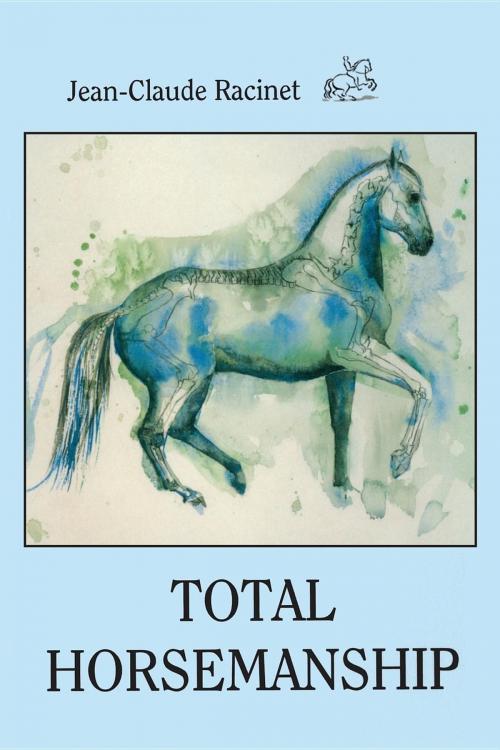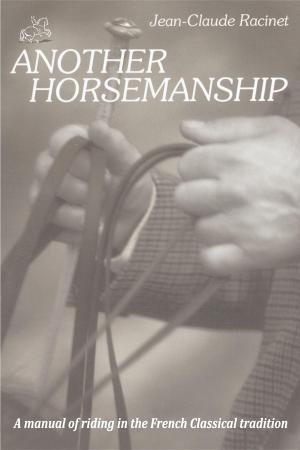TOTAL HORSEMANSHIP
A recipe for riding in absolute balance
Nonfiction, Sports, Horse Sports, Equestrian, Science & Nature, Pets, Horses, Nature| Author: | JEAN-CLAUDE RACINET | ISBN: | 9780933316935 |
| Publisher: | Xenophon Press LLC | Publication: | June 5, 2014 |
| Imprint: | Xenophon Press LLC | Language: | English |
| Author: | JEAN-CLAUDE RACINET |
| ISBN: | 9780933316935 |
| Publisher: | Xenophon Press LLC |
| Publication: | June 5, 2014 |
| Imprint: | Xenophon Press LLC |
| Language: | English |
Racinet provides a recipe for absolute balance, whereby all else succeeds. He searches for answers to riding problems from the inside and provides a thorough understanding of the cause. This is enjoyable reading, whereby you can gain relaxation in your horse. This book outlines and explains the concept of "riding in lightness" as understood by Jean-Claude Racinet who has spent his life riding and teaching the French School of horsemanship. Born in Paris in 1929, Jean-Claude Racinet is a graduate of St. Cyr, the French West Point, Class of 1950. He was a member of the French contingent in Korea (1950-53), where he was wounded twice. As an officer of the French army, he spent seven years in Tunisia and Algeria (1954-61) and four more years in Europe. While he spent most of his army career during the time when the military was getting rid of their horses, he managed, between and during his sojourns overseas, to successfully attend the Superior Equitation Course in the Cavalry School of Saumur (1953-54), winning the title of Champion of Tunisia in open jumping (1956), and to become a member of the Jumping Team of the Military School in Paris (1953). Riding teacher and trainer as a civilian after 9165, he was more particularly known by his retraining of difficult horses and later as an equestrian journalist by his always witty and sometimes scathing articles in the French equestrian monthly L'Information Hippique. In the United States since 1983, Jean-Claude Racinet became a successful teacher, trainer, lecturer, clinician, and author. Xenophon Press published in 1994 his highly popular book Another Horsemanship, now in its second printing. Jean-Claude Racinet has devoted his life to the vindication of "L'equitation de Legerete" (riding in lightness), which fosters balance by relaxing the horse - more so his mouth - excluding force in the wielding of the aids. In fact, the very essence of riding in the French Classical tradition. (softcover, photos, 135 pgs.) Excerpt from the book: From a rider's point of view, two distinct muscular functions preside over the equestrian performance. The first function assures locomotion. It Is acted out through an alternation of extensions and contractions. The second function must establish favorable articular angles and provide a fulcrum to the action of the muscles in charge of the first function. It upholds the structure. In one word, it assures the "posture." This second function works through a steady muscular tension. It is obvious that the muscles affected by the first function, which requires an intermittent tension, cannot in the meantime fulfill the second function, which requires a steady tension. Therefore the two muscle sets affected by either function are, at any given time, totally distinct. Their definition is, however, blurred, since in plain, day-to-day riding, at a walk or at a gallop or over the jumps, the posture constantly changes. At a trot, however, the posture is steady; the head position as well as the angle of the pelvis is pretty constant. At a trot, even at a racing trot, the horse's body is, so to say, "gelled"; its form does not change.
Racinet provides a recipe for absolute balance, whereby all else succeeds. He searches for answers to riding problems from the inside and provides a thorough understanding of the cause. This is enjoyable reading, whereby you can gain relaxation in your horse. This book outlines and explains the concept of "riding in lightness" as understood by Jean-Claude Racinet who has spent his life riding and teaching the French School of horsemanship. Born in Paris in 1929, Jean-Claude Racinet is a graduate of St. Cyr, the French West Point, Class of 1950. He was a member of the French contingent in Korea (1950-53), where he was wounded twice. As an officer of the French army, he spent seven years in Tunisia and Algeria (1954-61) and four more years in Europe. While he spent most of his army career during the time when the military was getting rid of their horses, he managed, between and during his sojourns overseas, to successfully attend the Superior Equitation Course in the Cavalry School of Saumur (1953-54), winning the title of Champion of Tunisia in open jumping (1956), and to become a member of the Jumping Team of the Military School in Paris (1953). Riding teacher and trainer as a civilian after 9165, he was more particularly known by his retraining of difficult horses and later as an equestrian journalist by his always witty and sometimes scathing articles in the French equestrian monthly L'Information Hippique. In the United States since 1983, Jean-Claude Racinet became a successful teacher, trainer, lecturer, clinician, and author. Xenophon Press published in 1994 his highly popular book Another Horsemanship, now in its second printing. Jean-Claude Racinet has devoted his life to the vindication of "L'equitation de Legerete" (riding in lightness), which fosters balance by relaxing the horse - more so his mouth - excluding force in the wielding of the aids. In fact, the very essence of riding in the French Classical tradition. (softcover, photos, 135 pgs.) Excerpt from the book: From a rider's point of view, two distinct muscular functions preside over the equestrian performance. The first function assures locomotion. It Is acted out through an alternation of extensions and contractions. The second function must establish favorable articular angles and provide a fulcrum to the action of the muscles in charge of the first function. It upholds the structure. In one word, it assures the "posture." This second function works through a steady muscular tension. It is obvious that the muscles affected by the first function, which requires an intermittent tension, cannot in the meantime fulfill the second function, which requires a steady tension. Therefore the two muscle sets affected by either function are, at any given time, totally distinct. Their definition is, however, blurred, since in plain, day-to-day riding, at a walk or at a gallop or over the jumps, the posture constantly changes. At a trot, however, the posture is steady; the head position as well as the angle of the pelvis is pretty constant. At a trot, even at a racing trot, the horse's body is, so to say, "gelled"; its form does not change.















